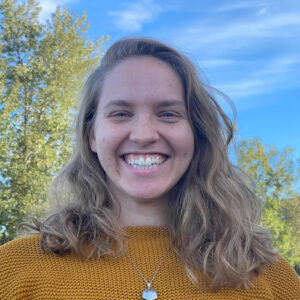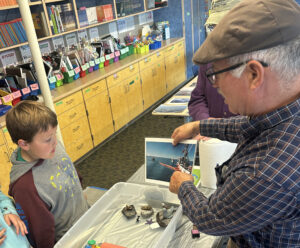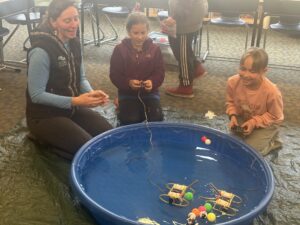
By Maia Draper-Reich, Outreach Coordinator
Each September, when the Council holds a Board meeting in one of our stakeholder communities, we host a youth engagement event called “Become a Master of Disaster.” Following a pause during the Covid pandemic, this event has been revitalized with two successful events, one in Kodiak in 2024 and another in Cordova this fall. The event educates and connects local children with topics related to our mission in an age-appropriate way.
Youth and caregivers move through a series of hands-on oil spill and marine science activities, facilitated by adults including Council Board members, committee volunteers, staff, and staff from partner groups. Students learn how oil spills are cleaned up and how oiled wildlife are cleaned and cared for during a response. They compete in a running race the length of an oil tanker, and learn to identify marine invasive species. Students collect stamps in a passport-style book and complete a reflection activity as their final stop before collecting a prize.
We have been grateful to include local partner organizations in the event. In Kodiak, the Kodiak Ocean Science Discovery Program, or KOSDP, donated use of their lab classroom space and supplies, and some of their educators joined Council staff and volunteers to run activities. KOSDP taught students about oil molecules and where oil comes from. They hosted a station about ocean life, where students could examine plankton under microscopes.

In Cordova, staff from the Prince William Sound Science Center led a hands-on opportunity for students to drive mini-remotely operated vehicles to collect ping pong balls (representing oil) floating in water. They also facilitated participants dressing up in oil spill personal protective equipment. Kate Morse, the Copper River Watershed Project’s Executive Director and member of the Council’s Information and Education Committee, worked with her staff to create an activity where youth learned about Geographic Response Strategies, or GRS, and then got to create one for Eyak Lake, a familiar local environmental resource. This tied in well with the Council’s recent work to update the Copper River Delta GRS. The activity successfully scaled the complex topic in an understandable way for elementary-age children.
The 2024 and 2025 participating groups routinely partner with the Council to support projects to educate local students. Their staff also collaborate on other Council projects and areas of overlap. Including local partners in this event strengthens connections with youth, as these partner staff are familiar and known adults and educators within their community.


Become a Master of Disaster engages Exxon Valdez oil spill region kids in oil spill and marine science topics that align with the Council’s mission in an age-appropriate educational format. Participants in both Kodiak and Cordova expanded their existing knowledge, learned more about oil spills, and drew connections to their local coastal environment and community. I am grateful to the local entities and partners, as well as Council volunteers and staff, for their contributions to make this event happen and for sharing their oil spill and marine science knowledge with the next generation of stewards.